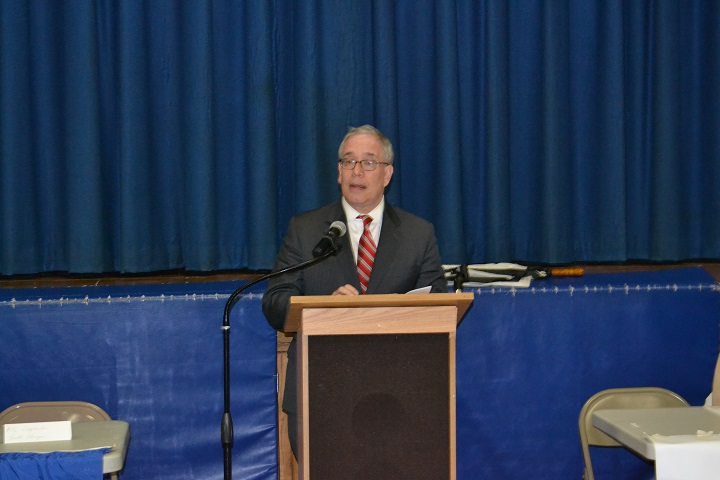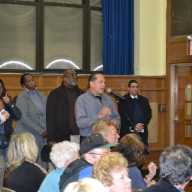With local residents feeling ignored and disrespected by Mayor Bill de Blasio, his administration, and the local elected officials regarding a proposed homeless shelter in Maspeth, City Comptroller Scott Stringer visited the Juniper Park Civic Association in Middle Village on Thursday night to address their concerns about the plan.
Stringer, one of many speculated challengers to de Blasio in next year’s mayoral election, sought to answer the questions of community members in order to open a dialogue with them and talk about long-term and lasting solutions to the city’s historic homelessness crisis, rather than just continue to put the homeless in hotel rooms.
“I wanted to come here so you could see the face, the hands, the eyes, to speak to you, to talk to you and think about the issues that we face,” Stringer told the crowd. “Look, I will tell you this, I know homelessness is on everyone’s mind, this is a crisis. Sixty thousand people are now in shelter systems, it could go as high as 70 [thousand].”
Because the number of homeless people across the city is so high, and could climb even higher, shelters are going to be needed, Stringer admitted. But he believes the community needs to be involved in the decision.
“Remember when there was something called community-based planning? We actually worked with the community. We thought about the plans together,” Stringer said. “We didn’t always see eye to eye — the government and the civic — but we worked it out … we can’t deal with [the homeless crisis] top down telling you what to do. We have got to create a conversation that respects your opinions, your views and your concerns.”
Some of the community’s concerns included knowing that their tax dollars are being spent properly when it comes to homeless shelter; the cost of keeping the homeless in hotels; and if the mayor is abusing the emergency declaration to quickly move homeless people into hotels without community approval.
As comptroller, Stringer is the city’s chief fiscal officer, so his office recently audited the shelter system and remediated many of the problems that were found, making sure that the taxpayer’s money is being used in the right way.
When it comes to the cost of sheltering homeless people in hotel rooms — which can cost up to $5,000 dollars per month, which goes to the owner of the hotel — Stringer does not believe the city should be spending thousands of taxpayer dollars to house homeless people in what are often “roach motels” or cluster sites. Instead, he says that truly permanent affordable should be built to keep people in homes.
Stringer explained that the emergency declaration was put in place to quickly move people off the streets if there was a crisis, much like the city is currently facing.
“If we only use [the] emergency [declaration] as an excuse to not be transparent to the community, well that is wrong,” Stringer said. “And that is why we need to invite and listen to the community.”
According to Stringer, one way to decrease the skyrocketing number of people in the city’s shelter system would be to create affordable housing to move people from shelters and into permanent housing, including using the vacant homes in the New York City Housing Authority’s (NYCHA) control.
“We have to have a plan to reduce the shelter population, which would reduce shelters, and come up with an affordable housing plan,” Stringer added.


































